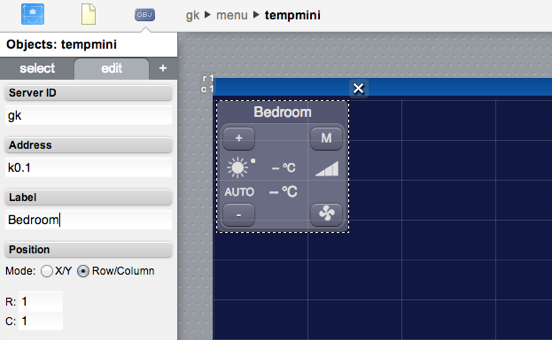Giacomini
The Giacoklima bus system equipped with the KM203 network controller allows for remote control and supervision, via Serial communication, of the whole heating/cooling framework.
Contents
Communication
Connect HSYCO to the KM203 controller employing an RS485 gateway.
RS-232 parameters:
| Baud rate | 19200 |
| Data bits | 8 |
| Stop bit | 1 |
| Parity | none |
| Flow control | none |
The Giacoklima bus architecture
This image illustrates an example of the system architecture: The RS485 port is on the top left corner of the KM203 interface as shown in the picture above.
HSYCO Configuration
Options
| ID | Default | Values | Description |
|---|---|---|---|
| gui | true | true | enable support for the UI object, UISET actions and USER commands |
| false | disable UI support | ||
| startupevents | false | true | generate IO events also during the driver’s start-up phase |
| false | start generating events only after HSYCO is aligned with the current status of the system | ||
| pollinterval | 1 | n > 0 | the data acquisition interval, in seconds |
The Giacoklima bus architecture
The gkbus.ini file is a specific configuration file located in the main directory (same directory as hsyco.ini or hsyco.jar).
Here you must add a line for each thermostat belonging to the framework and optionally specify a descriptive name of the corresponding area.
Use the format “<ioserver_id>.k<n>.<addr> = name”, where <ioserver_id> is the id of the referred I/O server, <n> is the number of the KPM20 module the thermostat is connected to and <addr> is the secondary address of the thermostat.
For instance:
gk.k0.0 = Kitchen gk.k0.1 = Bedroom gk.k1.0 = Entrance
Datapoints
| ID | Value | R/W | Description |
|---|---|---|---|
| connection | online | R | connection established |
| offline | R | HSYCO can’t connect to the panel | |
| k<n>.<addr>.name | <name> | R | the name of the addressed thermostat is set to the reported string |
| k<n>.<addr>.temp | <val> | R | the room temperature measured by the addressed thermostat is equal to <val> in °C/10 |
| k<n>.<addr>.setpoint.temp | <val> | R | the set-point temperature measured by the addressed thermostat is equal to <val> in °C/10 |
| W | set the set-point temperature of the addressed thermostat to <val> in °C/10 | ||
| k<n>.<addr>.humidity | <val> | R | the relative humidity measured by the addressed thermostat is equal to <val> |
| season | summer | R | the current season is set to summer |
| W | set the current season to summer | ||
| winter | R | the current season is set to winter | |
| W | set the current season to winter | ||
| k<n>.<addr>.mode | off | R | the addressed thermostat is set to mode “OFF” |
| W | set the addressed thermostat to mode “OFF” | ||
| com | R | the addressed thermostat is set to mode “Comfort” | |
| W | set the addressed thermostat to mode “Comfort” | ||
| stb | R | the addressed thermostat is set to mode “Stand-by” | |
| W | set the addressed thermostat to mode “Stand-by” | ||
| ngt | R | the addressed thermostat is set to mode “Night" | |
| W | set the addressed thermostat to mode “Night” | ||
| mode | off | W | set all the thermostats to mode “OFF” |
| com | W | set all the thermostats to mode “Comforts” | |
| stb | W | set all the thermostats to mode “Stand-by” | |
| ngt | W | set all the thermostats to mode “Night” |
User Interface
You can use a tempmini object to create a thermostat-equivalent interface.
Set the Server ID field to the I/O Server’s name and specify the address of the thermostat (K483 module) in the Address field using the format “k<n>.<addr>” where <n> is the number of the KPM20 module the thermostat is connected to and <addr> is its address (e.g. k0.1 represents the second thermostat connected to the first KPM20):
UISET Actions
| ID | Attribute | Set to | |
|---|---|---|---|
USER Commands
| Name | Param | Action |
|---|
Release Notes
3.3.0
- initial version release
Giacomini, GKBus and Giacoklima are registered trademarks of Giacomini SpA.
